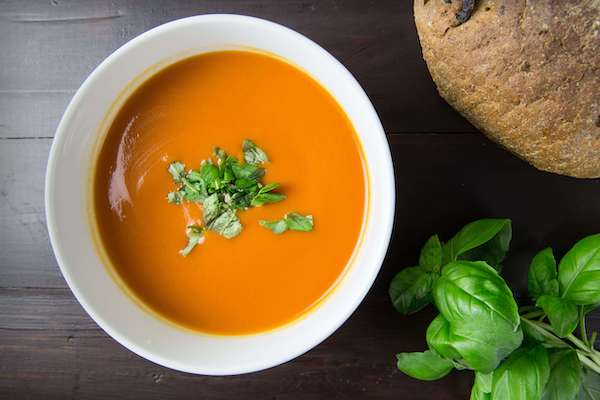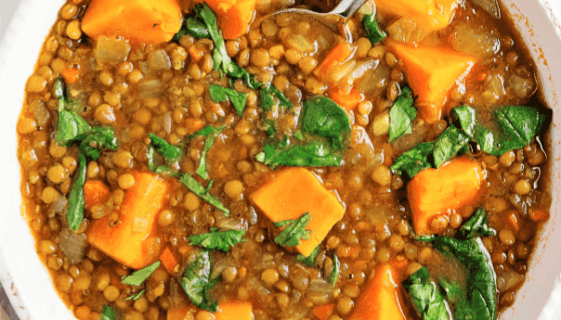When winter comes there is nothing better than a warm bowl of homemade soup. This carrot ginger soup is seasonal, healthy, filling, tasty and will warm you up after a long day. With a depth of flavors this creamy, vibrant soup is a wholesome, warming lunch or makes for a great first course.
The best part? It is simple and extremely inexpensive to prepare. In addition to delivering big on flavor, this soup is also very nourishing. The warmth can help relieve congestion, while the spices, herbs, onions and carrots can help your cells fight off those stubborn viruses lurking by providing a powerhouse of antioxidants to reduce inflammation and improve immune function. This dairy-free soup is a great staple recipe to have in your back pocket.
Ingredients
- 3 tablespoons oil (my preference is coconut oil)
- 1 teaspoon ground coriander
- 1/2 teaspoon ground mustard
- 1/2 teaspoon curry powder
- 1 tablespoon minced or grated fresh ginger or 2 teaspoons ground ginger
- 2 cups chopped onions
- 1 1/2 pounds carrots, sliced into rounds
- Zest of 1 lime (reserve a ½ tsp for garnish)
- 1 lime juiced
- 5 cups vegetable stock
- 1 can coconut milk (do not shake it)
- Salt to taste
- Fresh mint, more lime zest, drizzle of hot sauce (if you like spicy) and coconut cream to garnish
Directions
- To ensure that the coconut cream and water are separate, place the coconut milk can in the freezer overnight. Open the can of coconut milk and separate the coconut cream that is at the top from the coconut water. Reserve the coconut cream for garnishing.
- Heat up the oil in a large pot over medium heat.
- Add in the spices and onions, cooking until onions are soft and spices are fragrant.
- Add in the carrots and toss to coat with spices. Cook for 1-2 minutes.
- Add the lime juice and zest, vegetable sock and coconut water.
- Bring to a boil and reduce to a simmer for about 10 minutes, until carrots are very soft.
- Blend soup in batches in a blender making sure to not over fill blender. Return to pot and season with salt to taste.
- Mix the coconut cream with lime zest together.
- Ladle soup into a bowl and top with coconut cream and fresh mint
Carrots: Packed full of Beta-carotene (precursor to vitamin A). Vitamin A is integral for vision and immune function, as well as skin and bone health. Beta-carotene is a powerful antioxidant that can reduce inflammation and boost immune function by increasing disease-fighting cells in the body and assists cells in protection against viruses. Scientists have also reported that carotenoid-rich foods (orange foods) can help reduce the risk of heart disease and cancer (especially in the lungs, esophagus, and stomach), and can improve immune system function. Carrots are also an excellent source of vitamin C, an antioxidant that helps destroy free radicals and support the body’s natural immune response, by reducing oxidative stress.
Onions: Considered a prebiotic, meaning onions feeds the “good” bacteria in our gut and promotes a healthy digestive system. Research supports that the compounds, such as allicin in onions, has antioxidant, anti-inflammatory, antimicrobial, and cardio-protective properties
Ginger: Shown to be heart healthy and assists with blood sugar control by lowering cholesterol and blood sugar levels. Ginger also improve various heart disease risk factors. Ginger supports gut health and is highly effective in promoting digestive health and chronic indigestion. Powerful anti-inflammatory properties and can ease joint pain and stiffness. It is also antimicrobial and can lower risk of infections and boost immune system.
Coconut Oil and Milk: The fat from coconut can allow our body to better absorb these essential fat-soluble vitamins (A, D, E, and K). It can increase the good cholesterol levels (HDL). The fat in coconut is 90% MCTs which has shown to have a positive effect on metabolism and inflammation. MCTs have also shown to increase satiety leading us to feel more satisfied after consumption. Great non-dairy alternative for soups and sauces.
Mint and Cilantro: Herbs rich in nutrients such as Vitamins A, C, and K, and is packed full of antioxidants that help reduce oxidative stress in the body. Such antioxidants are lutein, beta carotene, and zeaxanthin which not only are known to reduce the risk of cancer, but also can prevent age-related macular degeneration and support liver health.
Curry Powder: This is a very broad term and can refer to any number of unique spice combinations. The three main curry powders I gravitate towards are garam masala, madras and tandoori masala. Though each blend is different, there are many overlapping ingredients in most curry powder blends. Cumin, coriander, cloves, nutmeg, cinnamon, chili, turmeric, cardamom, fennel, fenugreek, and paprika are all common spices in curry powder. This combination of spices has been linked to lower inflammation, boost immunity and metabolism as well as support gut health. It can even make you feel good from the capsaicin in the chilies that promotes the secretion of endorphins.



 Ananda Kaplan
Ananda Kaplan 

